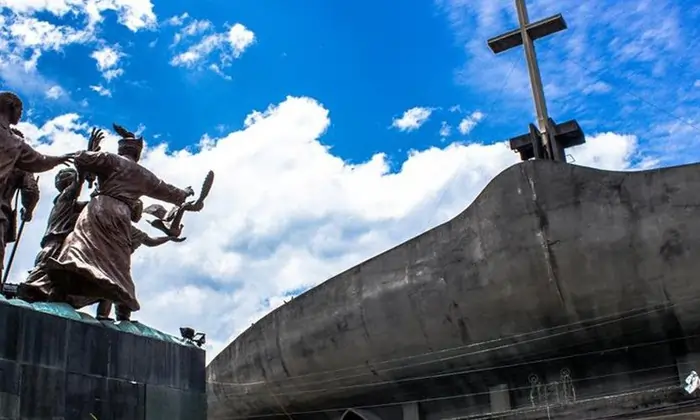Catholic Chapel | May 19 Solemn Mass Deadly Bombing

Table of Contents
Attack on Pentecost: A Comprehensive Review
Introduction
On May 19, a significant tragedy struck the Catholic chapel in Cotabato, Philippines, when extremists targeted a chapel during the Pentecost celebration. This heinous act of violence left the community in shock, mourning the loss of innocent lives and grappling with the aftermath. This review aims to provide a comprehensive understanding of the attack, its impact on the local and global Catholic chapel communities, and the broader implications for peace and security in the region.
COTABATO CITY — Retired Cotabato Archbishop Orlando Cardinal Quevedo has condemned the grenade attack on a Catholic chapel here on Sunday, saying it was a “sacrilegious act” targeting people in the midst of worship.
Two persons were hurt when unidentified men lobbed a hand grenade into the Santo Niño Chapel in Barangay Rosary Heights 3 here at 10:30 a.m. on Sunday while a Bible service was ongoing.
Background on Cotabato and Its Religious Significance
Cotabato, located in the Mindanao region of the Philippines, is a melting pot of various cultures and religions. This area has a significant Muslim population, but it also has a substantial Christian community. The Catholic Chapel in Cotabato has played a crucial role in promoting peace and interfaith dialogue in a region often troubled by religious and ethnic tensions.
The Importance of Pentecost in the Catholic Church
Pentecost is one of the most important feasts in the Christian liturgical calendar. It commemorates the descent of the Holy Spirit upon the apostles and other followers of Jesus Christ, as described in the Acts of the Apostles (Acts 2:1-31). This event is considered the “birthday” of the Catholic chapel, marking the beginning of its mission to the world. For the Catholic chapel community in Cotabato, the Pentecost celebration is a time of joy, unity, and spiritual renewal.
Details of the Attack
The Sequence of Events
On May 19, as the faithful gathered for the Pentecost Mass, a group of armed extremists launched a coordinated attack on the chapel. The attackers, armed with explosives and firearms, stormed the building, causing chaos and destruction. Eyewitnesses reported hearing a loud explosion followed by gunfire, which created panic among the worshippers.
Casualties and Damage
The attack resulted in numerous casualties. Initial reports confirmed the deaths of several churchgoers, with many others injured. The explosion caused significant structural damage to the chapel, and the ensuing gunfire left the interior of the building riddled with bullet holes. Emergency services responded quickly, but the chaos made it difficult to provide immediate medical assistance to all the victims.

Response from Authorities and Community
Immediate Reaction
Local authorities and emergency services responded swiftly to the attack. Police and military forces were deployed to secure the area and prevent further violence. The injured were rushed to nearby hospitals, and efforts were made to account for all individuals present during the attack.
Government and Church Leaders’ Statements
The Philippine government condemned the attack in the strongest terms. President Ferdinand Marcos Jr. issued a statement expressing his condolences to the victims’ families and vowing to bring the perpetrators to justice. Similarly, leaders of the Catholic Chapel, including Cardinal Luis Antonio Tagle, called for peace and unity while urging the faithful to remain resilient in the face of such adversity.
Community Solidarity
In the aftermath of the attack, the local community, regardless of religious affiliation, came together to support the victims and their families. Vigils and prayer services were held, emphasizing the community’s solidarity and commitment to peace. Various non-governmental organizations and interfaith groups also offered their support, providing aid to those affected.
Broader Implications
Impact on Interfaith Relations
The attack on the Cotabato catholic chapel is a stark reminder of the challenges to interfaith harmony in regions with a history of religious conflict. Despite efforts by many community leaders to promote dialogue and mutual understanding, extremist actions threaten to unravel the delicate fabric of interfaith relations.
Security Concerns
This incident has raised significant security concerns, not only in Cotabato but across the Philippines. It highlights the persistent threat posed by extremist groups, particularly in regions with existing socio-political tensions. The government and security forces are under increased pressure to enhance protective measures for vulnerable communities and religious sites.
Psychological and Social Impact
The psychological trauma inflicted on the survivors and the broader community cannot be understated. Many individuals are left with deep emotional scars, which could have long-term social implications. The attack has also fostered an atmosphere of fear and uncertainty, potentially hindering community activities and participation in religious services.

Efforts Towards Healing and Reconstruction
Spiritual and Psychological Support
In response to the psychological toll of the attack, the Catholic chapel and various non-profit organizations have initiated counseling and support programs. These efforts aim to help individuals process their trauma and begin the journey towards healing. Spiritual leaders are also emphasizing messages of hope and resilience in their sermons and community engagements.
Reconstruction of the Chapel
Plans for the reconstruction of the damaged chapel are underway. The local diocese has launched fundraising campaigns to gather the necessary resources. This effort is seen not only as a physical rebuilding but also as a symbol of the community’s determination to rise above the tragedy.
Long-Term Peace Initiatives
Recognizing the need for sustained peace efforts, several organizations have proposed long-term initiatives to address the underlying issues that lead to such violence. These initiatives include educational programs to promote tolerance, interfaith dialogue sessions, and community-building activities aimed at fostering unity and understanding.
Lessons and Future Directions
Strengthening Community Resilience
One of the key lessons from the Cotabato catholic chapel attack is the importance of community resilience. Building strong, cohesive communities that can withstand and recover from such shocks is crucial. This involves not only physical and economic support but also emotional and spiritual fortitude.
Enhancing Security Measures
The attack has underscored the need for enhanced security measures at religious sites and during major religious events. This includes increased surveillance, better communication between security forces and community leaders, and proactive measures to identify and neutralize threats.
Promoting Interfaith Understanding
Long-term peace in regions like Cotabato can only be achieved through continued efforts to promote interfaith understanding and cooperation. Programs that encourage dialogue and collaboration between different religious groups are essential. These programs should be supported by both the government and civil society organizations.

Public Outcry Following the Catholic Chapel Attack
Local Community Response
The local community in Catholic chapel was deeply shaken by the attack. Residents, regardless of their religious affiliations, expressed their shock and grief. Vigils were held in various parts of the city, with people lighting candles and offering prayers for the victims. Social media was flooded with messages of solidarity and calls for peace, reflecting the communal spirit in the face of adversity.
National Reaction
Across the Philippines, there was a wave of condemnation and support for the victims. Public figures, including celebrities and politicians, used their platforms to denounce the violence and call for unity. Hashtags such as #PrayForCotabato and #PeaceForMindanao trended on social media, illustrating the widespread concern and empathy from the Filipino populace.
Catholic Church
The Catholic church in the Philippines and worldwide reacted strongly to the attack. Cardinal Luis Antonio Tagle, a prominent figure in the global Catholic chapel, issued a heartfelt statement urging for calm and unity. He emphasized the need for forgiveness and reconciliation while condemning the violence unequivocally. Local bishops and priests held special masses and prayer services to honor the victims and pray for peace.
Interfaith Responses
Leaders from other religious communities, including Muslim, Protestant, and indigenous faith groups, also voiced their condemnation of the attack. They called for increased interfaith dialogue and cooperation to prevent such incidents from happening again. The grand imam of a major mosque in Cotabato visited the site of the attack to offer his condolences and support, symbolizing a unified stance against violence.
Government Response
The Philippine government, led by President Ferdinand Marcos Jr., responded swiftly to the attack. The President visited Cotabato to meet with victims’ families and local officials. In his public address, he condemned the attackers as enemies of peace and vowed to bring them to justice. He also announced the formation of a task force to investigate the incident and prevent future attacks.

The Verdict on the Cotabato Chapel Attack
Investigation Process
Following the attack, law enforcement agencies launched a swift and comprehensive investigation. The area around the chapel was secured, and forensic teams worked diligently to gather evidence. This included collecting bomb fragments, bullet casings, and other materials that could provide clues about the perpetrators. Witnesses were interviewed, and CCTV footage from the vicinity was analyzed to track the movements of the attackers.
Identifying Suspects
Based on the evidence gathered, investigators identified several suspects linked to known extremist groups operating in the region. These groups have a history of targeting religious sites and are believed to have connections with international terrorist networks. The Philippine National Police (PNP) and the Armed Forces of the Philippines (AFP) coordinated efforts to track down and apprehend the suspects.
International Cooperation
Given the potential international links of the suspects, Philippine authorities sought assistance from global intelligence agencies. This cooperation helped in identifying the broader network involved and understanding the operational methods of the extremist groups. Interpol and other international bodies provided critical intelligence and logistical support.
Conclusion
The attack on the Catholic chapel during the Pentecost celebration is a tragic reminder of the ongoing challenges faced by communities in conflict-prone regions. However, the resilience and solidarity shown by the people of Cotabato offer hope for a better future. By addressing the immediate needs of the victims, enhancing security measures, and promoting long-term peace initiatives, it is possible to honor the memory of those lost and build a more harmonious and secure community.
We also recommend

Jom Bourie a professional poker player and an author of books about poker. Boasts an impressive 37-year tenure in the gambling industry, with a passion for gaming that has earned him a reputation as a trusted and knowledgeable figure. His dedication to precision, integrity, and transparency has enabled him to provide players with unparalleled insights and recommendations for exceptional online gaming experiences.
His videos have been viewed more than 22 million times on YouTube and his casino travel articles have appeared in magazines. He has also written numerous articles for gaming magazines circulation gaming magazines.